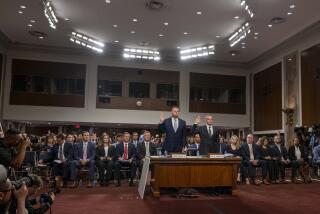FBI’s Ruby Ridge Snipers Defend Their Actions, Deny Overreaction : Hearing: Agent says two men were running for cabin when his partner fired shot that killed Vicki Weaver. Senators question rules of engagement.
- Share via
WASHINGTON — FBI snipers Thursday defended their actions at the 1992 Ruby Ridge, Ida., siege in which a member of their team killed an unarmed woman, contending that danger to an FBI observation helicopter from armed men outside the woman’s cabin justified the shots that were fired.
But skeptical senators questioned whether permissive shoot-to-kill orders and exaggerated information about the threat posed by Randy Weaver, the woman’s husband, led to an overreaction.
Dale R. Monroe, the partner of FBI hostage rescue team leader Lon Horiuchi--who fired the fatal shot--said that he was preparing to fire but did not because Horiuchi fired first.
Horiuchi invoked his 5th Amendment protection against self-incrimination Tuesday after the Senate Judiciary subcommittee on terrorism refused to give him limited immunity from prosecution.
“We don’t have Mr. Horiuchi here,” subcommittee Chairman Arlen Specter (R-Pa.) pointed out Thursday to underscore the importance of the snipers’ testimony. “You are as close as we have.”
The panel is trying to determine what took place at Ruby Ridge on Aug. 21 and 22, 1992, when deputy U.S. marshals seeking to arrest Weaver for failing to appear in court on illegal gun sale charges led to a confrontation in which deputy marshal William E. Degan and Weaver’s 14-year-old son, Sammy, were killed. The FBI’s hostage rescue team was called in, and Weaver’s wife, Vicki, standing behind a cabin door, was killed by a shot fired by Horiuchi. Horiuchi has testified previously that he was firing at one of the men running to the cabin.
To some government critics, the Ruby Ridge siege has become a symbol of law enforcement excess.
But Monroe seemed to speak for his colleagues when he opened his testimony by challenging the label of “trained killers” given to the team last week by Weaver lawyer Gerry Spence. “We are trained to save lives,” Monroe said, noting that Congress commended the unit for its rescue of hostages without firing a shot at the 1991 Talladega, Ala., federal prison riot.
“The trained killer accusation is unfair to all dedicated agents and to the widow of U.S. Marshal William Degan,” Monroe said.
Monroe said that he saw two men--Weaver and his friend Kevin Harris--running into the cabin when Horiuchi fired his second shot, the one that struck Mrs. Weaver.
Specter asked how the second shot could be justified under the standard deadly force policy, because the men were running into the cabin. He noted that a Justice Department task force had found that shot unconstitutional, a finding that was disputed by the department’s internal watchdog unit and by its civil rights division.
Monroe said Thursday: “I totally disagree” with the task force finding.
Monroe said he believed the helicopter to be in danger whether the rifle-carrying men were in or outside the cabin. In fact, he contended, the threat was “heightened” if they gained entry into the cabin because the FBI knew there were children inside. Sen. Herb Kohl (D-Wis.), the panel’s ranking minority member, disputed the claim that the standard deadly force policy was in effect at the Ruby Ridge incident, citing the Oct. 28, 1993, testimony for the department task force by sniper Edward C. Wenger Jr.
“My understanding of the rules of engagement was that if I saw an armed adult male outside the residence, I was to use deadly force against that individual,” Kohl said, reading from a transcript of Wenger’s testimony.
“Not ‘I should or I might or I could’ but ‘I was to use deadly force’ and those were your words,” Kohl said.
“I don’t ever recall saying that,” Wenger said.
Explaining what the revised rules meant to him, Wenger said: “Could means just that, could. It lets me exercise my judgment as a sniper-observer and special agent of the FBI. Should, granted, is a little stronger wordage than could. But it still lets me use my judgment on a matter. . . .
“It never said must. Unless I feel a situation is justified, I’m not going to pull the trigger, because that’s something I’m going to have to live with for the rest of my life,” Wenger said. “And that’s not just a moral conviction that I have. I think that’s also something that’s ingrained in us from the first [time] we come into the FBI.”
More to Read
Sign up for Essential California
The most important California stories and recommendations in your inbox every morning.
You may occasionally receive promotional content from the Los Angeles Times.













